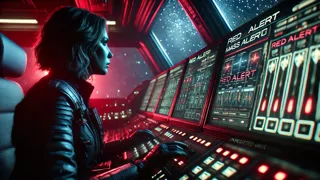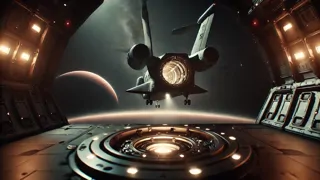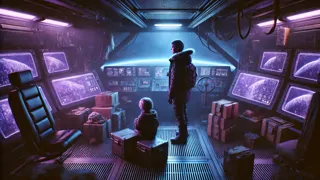Introduction
Commander Ava Winters leaned into the neural feedback harness as the last arc of sunlight slipped behind the Osprey’s hull, leaving the cockpit awash in violet gloom. She scanned the mission manifest one final time: supplies for the Martian outpost, emergency caches, and the calculated reserves of fuel that obeyed the cold equations—immutable rules ensuring every gram of mass had purpose, every drop of propellant was accounted. Beyond the viewport, a silent sea of stars reflected her steely resolve. Preparing to ignite the descent burn toward Arcadia Planitia, she fluttered through protocols with practiced precision, her voice steady even as adrenaline hummed in her veins. Then, an unanticipated temperature spike flickered on the cargo bay display. Trembling, she directed the cameras and revealed a stowaway—a small, pale child clutching a relic from Earth. Panic warred with duty. The station’s safety algorithms demanded the ejection of all unregistered mass to preserve orbital integrity. No override existed without condemning the mission. Winter’s fingers hovered over the purge controls as the girl’s frightened gaze met hers. In the tension between icy mathematics and fragile humanity, she faced an impossible choice. The cold equations would not bend, yet her conscience implored mercy. Her heart thundered in sync with the station’s warning klaxons as she weighed the mathematical certainty against the spark of life before her. Every protocol screamed compliance; every instinct pleaded compassion.
Immutable Laws
Commander Winters sat starshafted above the Martian horizon as the freighter’s thrusters whispered in the void. She accessed the mission computer, the readouts glowing coldly, listing every ounce of payload according to an unbreakable formula. There was no margin for error; the station’s orbital mechanics could not tolerate a single gram of unaccounted mass. Each data line felt like another brick in an unyielding wall of duty. In her headset, the faint pulse of Earth-borne engineers monitored her approach profile. They trusted her to deliver lifesaving supplies and the nanofabricators that would accelerate Arcadia Planitia’s terraforming schedule. A flawless rehearse of the descent procedure had played in her mind for weeks—but it never included a stowaway.

stowaway-discovery-cockpit-glow.webp
When the temperature sensors flagged a life signature amid the cargo, her heart jolted. The feed showed a child, eyes wide with terror, curled into the corner of a supply container. Her training kicked in: isolation protocols, medical triage, emergency override matrix. But the command net locked every unregistered object into the purge algorithm. There was no way to classify an unauthorized passenger as “essential” without manual intervention—and the manual intervention carried devastating risks. Without ejecting nonessential mass, she would burn too heavily, overshoot the atmosphere, and extinguish months of planning in a single miscalculation.
Pain lanced through Winter’s chest. The girl’s trembling silhouette told a story of desperation and hope. Winters replayed the cold equations in her mind: mass, thrust, delta-v, trajectory—the ruthless calculus of orbital science. Inside that formula, humanity had no foothold. Every choice came at equal cost of lives and schedules, of projects and people’s faith. Duty warred with mercy, and Winters felt the pull of two worlds, neither forgiving.
A Heart Against Calculus
Below the Osprey’s hull, the rusty plains of Arcadia Planitia stretched toward the rising sun of Mars. Inside the narrow cabin, the stowaway child trembled beneath a thermal blanket, her small face pressed against the plexiglass viewport. Winters knelt beside her, voice soft over the hiss of life-support vents. “Why did you come aboard?” she asked, balancing compassion against the grim purpose of her mission. The girl’s whispered answer—an orphan seeking refuge from collapse on Earth—struck Winters with the force of gravity itself.

maritan-plains-through-viewport.webp
Visions of burning cities and broken governments flooded her thoughts. Every engineered equation demanded the girl’s removal; every moral fiber within her body cried out to protect this fragile spark of life. The nav-computer droned in her ear, iterating abort sequences and contingency protocols. In the hum of the engines, she heard the ghost of her own childhood in those frightened breaths. She recalled boarding her first shuttle at thirteen, clutching a photo of her family. She recalled the moment she vowed never to let the stars feel colder than humanity.
Sweat pooled at her collarbone. She overrode secondary diagnostics to run a simulated jettison, watching the trajectory arc away from the station’s path. It was clean, precise—within engineering margins for a ten-kilogram reduction. But the child added fifteen. Every extra kilo jeopardized the outpost’s critical equipment below. Winters typed commands with a shaking hand, heart pounding. Life hung in a balance of thrust vectors and supply manifests, of steel-clad policy versus the one beating heart before her. The equations did not allow compassion—but the universe had a different plan.
Echoes of Sacrifice
As the countdown to descent began, the ship’s inertial compensators hummed in readiness. Winters pulled the girl into her arms, feeling the fragile pulse against her chest. Behind her, the freighter’s bulkheads shivered with impending deceleration. Time stretched. In that endless beat between ignition and impact, she replayed every memory of loss and determination that had led her to this moment. Her mentors had warned her of impossible choices; her peers had celebrated her precision. Now all that training funneled into a single act born of mercy.

deceleration-ignition-red-plume.webp
With a broken sob, she released the emergency bulkhead latch and carried the girl to the airlock bypass panel. She keyed in the override codes—hand-etched on a data plate long buried beneath protocol layers. The station’s AI detected the anomaly, and klaxons pierced the cabin once more, faster, more insistent. Winters knew the moment she cycled the panel, she would breach policy. Yet her breath faltered only once before she engaged the soft-release. A hiss of escaping air filled the corridor as the outer hatch slid open against the black of space.
She locked eyes with the girl. “Stay close,” Winters whispered, pushing her through the lock into the void. The girl floated free, strapped to a small pod rigged with an autopilot beacon. In that flash of starlight, the child’s tearful hope carried across millions of kilometers. Winters hit the manual jettison command. The pod rocketed away, its thrusters leaving a silvery arc against the void. The freighter shuddered, the missing mass calculated instantly by the mission computer. The descent burn engaged precisely, and Winters guided the Osprey toward Mars.
A hush settled in the cockpit. The consoles glowed steadily rather than glaring alarms. She exhaled, tasting salt and steel. The cold equations had bent—just enough.
Conclusion
Commander Winters watched the Martian horizon rush to meet her as the descent burned half-tonnage of propellant to compensate for the newly lightened ship. Below, the outpost’s greenhouses bloomed beneath geodesic domes, unwitting beneficiaries of her sacrifice. In the silent wake of her decision, she whispered a promise to the drifting child: that no equation could measure the worth of compassion. The mission succeeded on paper; supplies landed within margins, terraforming efforts remained on schedule, the Council sang her praises. Yet none would know of the orphan’s fragile chirp aboard a lone pod, carrying the hope of a future stolen from one world to be reborn on another.
Long after the engines cooled and the hull froze to Martian temperatures, Winters stood alone under the alien sky, staring up at the trajectory trail etched against the stars. The cold equations weighed on her still, but her conscience warmed with the certainty that mercy, though unrecorded in official logs, had rewritten a harsher fate. In the vast ledger of cosmic calculus, she learned that true calculation lay not in numbers, but in the echoes of a single choice.


















